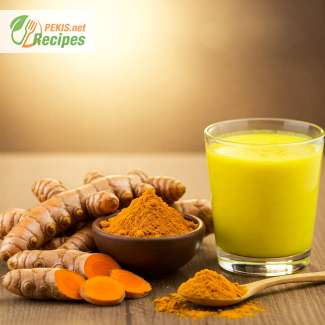
The Ultimate Guide to Turmeric: Benefits, Uses, and Essential Insights
Understanding the Power of Turmeric
Turmeric is more than just a spice—it is a superfood packed with powerful antioxidants, anti-inflammatory properties, and a rich history in traditional medicine. This golden ingredient is widely used in cuisine, health supplements, and natural remedies due to its remarkable benefits. But what makes turmeric so special? In this comprehensive guide, we explore the origins, characteristics, uses, and benefits of turmeric, along with its role in recipes, health, and home cultivation.
What Is Turmeric? A Deep Dive into Its Origins and Composition
Turmeric (Curcuma longa) is a perennial flowering plant belonging to the ginger family (Zingiberaceae). Native to South Asia, especially India and Indonesia, turmeric has been cultivated for thousands of years. The plant's rhizomes are harvested, dried, and ground into the distinctively golden-yellow spice commonly used in cooking, traditional medicine, and natural dyes.
The active compound in turmeric, curcumin, is what gives it its anti-inflammatory and antioxidant properties. Curcumin is widely studied for its potential health benefits, including reducing chronic inflammation, improving brain function, and supporting heart health. While turmeric is widely available in powder, capsule, extract, and even fresh root form, its effectiveness often depends on bioavailability, meaning how well it is absorbed by the body.
Turmeric has long been a staple in Ayurvedic and Chinese medicine, where it is used to treat various ailments, from digestive issues to skin conditions. Today, it remains a popular natural remedy and an essential ingredient in many modern health products.
Characteristics of Turmeric: Appearance, Taste, and Aroma
Turmeric is instantly recognizable due to its:
- Vibrant golden-yellow color: This pigment is derived from curcumin, giving it a distinctive hue.
- Earthy, slightly bitter taste: It has a peppery, warm flavor with hints of ginger and citrus.
- Aromatic, musky scent: The essential oils present in turmeric give it a woody, slightly spicy fragrance.
- Fibrous, knobby texture: When fresh, turmeric resembles ginger root but is smaller and denser.
Turmeric's versatility makes it suitable for a wide range of applications, from spices and teas to cosmetic and medicinal products.
Why Is Turmeric Used? A Look at Its Applications
Turmeric serves multiple purposes, making it a highly valuable ingredient. Here are some of its key uses:
- Culinary Use: Essential in curries, stews, soups, and marinades.
- Health Supplements: Available in capsules, powders, and extracts for wellness support.
- Ayurvedic Medicine: Used for detoxification, digestion, and immune health.
- Skin Care: Incorporated into face masks, creams, and serums for its anti-inflammatory effects.
- Natural Dye: Utilized for coloring textiles, cosmetics, and food.
- Tea & Beverages: Featured in turmeric lattes, golden milk, and herbal teas.
- Pain Relief & Healing: Applied topically in pastes and balms for joint and muscle pain.
With such diverse applications, turmeric is a must-have for health-conscious individuals and culinary enthusiasts alike.
How to Use Turmeric Effectively
Turmeric can be consumed in various ways, including:
- As a spice in food, such as curries, soups, and rice dishes.
- As a beverage, like golden milk, herbal tea, or smoothies.
- As a supplement, available in capsule, extract, or powder form.
- In skincare, as an ingredient in masks and creams for glowing skin.
- In medicinal pastes, combined with honey, milk, or aloe vera for healing benefits.
To maximize absorption, turmeric is often paired with black pepper (piperine) or healthy fats, which enhance curcumin bioavailability.
Health Benefits of Turmeric
Turmeric is celebrated for its numerous health benefits, including:
- Anti-inflammatory properties: Helps reduce chronic inflammation linked to arthritis, heart disease, and autoimmune disorders.
- Powerful antioxidant effects: Protects against cell damage and aging.
- Supports brain function: May boost memory and cognitive health.
- Promotes heart health: Aids in reducing cholesterol and improving circulation.
- Aids digestion: Helps alleviate bloating, indigestion, and gut health issues.
- Enhances immunity: Strengthens the body's defense against infections.
- Natural pain relief: Used to soothe sore muscles and joints.
- Supports skin health: Reduces acne, eczema, and psoriasis symptoms.
How Does Turmeric Work in the Body?
Turmeric's effectiveness lies in its curcumin content, which influences various biological pathways. It modulates inflammation, neutralizes free radicals, and supports enzyme function in the body. By interacting with the body's immune, digestive, and circulatory systems, turmeric contributes to overall well-being.
Secret Tips for Using Turmeric
- Combine with black pepper to increase absorption.
- Mix with coconut oil or ghee for better bioavailability.
- Use in warm beverages for a soothing, health-boosting effect.
- Apply as a face mask for radiant skin.
- Consume daily for long-term benefits.
Why Turmeric Is a Must-Have in Recipes
- Adds depth and warmth to dishes.
- Enhances nutritional value.
- Pairs well with spices like ginger, cinnamon, and cumin.
- Used in smoothies, soups, rice, and desserts.
Home Cultivation and Growing Turmeric
Turmeric is easy to grow at home, requiring:
- Warm, humid climates.
- Well-draining soil with rich organic matter.
- Partial to full sunlight.
- Regular watering but no waterlogging.
Harvest after 8-10 months for the best quality roots.
Nutritional Values of Turmeric (Per 100g)
- Calories: 354 kcal
- Carbohydrates: 64.9 g
- Fiber: 21 g
- Proteins: 7.8 g
- Fat: 9.9 g
- Iron: 41.4 mg
- Potassium: 2525 mg
- Vitamin C: 25.9 mg
Turmeric is one of the most powerful natural ingredients with countless health and culinary benefits. Whether used in food, medicine, or skincare, turmeric remains a staple for a healthy lifestyle.
Incorporate turmeric into your daily routine and unlock its full potential today!